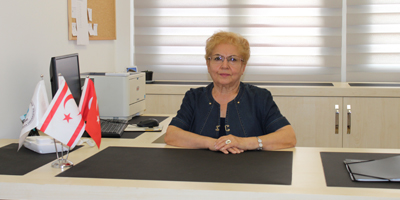EUL Faculty of Dentistry Dean Yurdukoru discussed the issue of “Oral health and Covid -19 disease”

High risk of disease transmission and cross infection in dental environments
Dean of the European University of Lefke (EUL) Faculty of Dentistry Prof. Dr. Bengül Yurdukoru made some briefings on the subject of “Oral health and Covid -19 disease”.
Expressing that the COVID-19 disease caused by the SARS-CoV-2 virus has become a general public health problem affecting the whole world, Yurdukoru stated that the World Health Organization (WHO) first reported this epidemic as an “international alarming public health emergency”. She stated that he then declared it as a “pandemic”.
“SARS-CoV-2 uses the same receptors (ACE2) as SARS-CoV to enter target cells, but it has higher binding ability. After entering the human body, SARS-CoV-2 is abundantly found in saliva and nasopharyngeal secretions in affected patients. This suggests that it spreads through droplet and aerosol respiration, ”said Yurdukoru, who said that considering the direct or indirect ways of transmission of COVID-19 from person to person, the risk of transmission and cross-infection in dental environments is high.
“According to clinical data obtained from COVID-19 cases; Loss of taste and smell are seen as early symptoms before the prominent symptoms of the disease such as fever, dry cough, and fatigue. The first entry point of the SARS-CoV-2 virus in humans is the upper respiratory tract mucosa. This clinical situation points out that dentists will have an effective role in the early diagnosis of COVID-19 and preventing its transmission, ”said Yurdukoru, and stated that the SARS-CoV-2 virus enters the body through the nose, mouth and cornea and settles in the respiratory tract and lungs. Yurdukoru continued her words as follows: “It is transmitted directly by cough, sneezing and droplets. If indirect transmission; is the way of contact. It can be transmitted by touching a surface that the patient touches and then touching the hand to the nose, mouth and eyes. There are publications stating that the virus can reach up to 8 meters with coughing and sneezing. The virus is very contagious and each patient can infect a large number of people. It is not resistant to soap, ” she said.
Dentists are one of the professions with the highest risk of contamination.
Yurdukoru stated the following in her statement; “It has been determined in studies that epithelial cells of the tongue, buccal mucosa, gingiva and salivary gland canals in the oral cavity express ACE2 at high levels. The risk of transmission of the SARSCoV-2 virus to cells expressing ACE2 receptors is considered to be significant. Therefore, it is accepted that the oral cavity mucosa may be a high risk pathway for the spread of the SARS-CoV-2 virus. Dentists are one of the occupational groups with the highest risk of contamination. There are publications reporting that the risk of COVID-19 disease is high due to close, face-to-face contact with dentists. It is known to be transmitted by aerosols formed during dental procedures or indirectly from saliva. ”
Fixing the mask by hand or removing it by holding it from the outer face may be a way of transmission of the virus.
Yurdukoru said, “We can take some measures to protect our personal protection and keep our immune system strong in order not to get sick during the COVID-19 epidemic,” said Yurdukoru, therefore, she listed her protection recommendations:
1. It is important to use masks. The main thing is that sick people use the mask. WHO has recommended that everyone wear a mask at this time when the pandemic is very effective. The protection level of the mask should be high. Fixing the mask manually, holding it from the outer face, may be a way of transmission of the virus.
2. It is important to wash hands with soap as recommended. It is important to wash all faces of the hands, fingers, and fingers with soap for at least 20 to 40 seconds, and then dry them with disposable napkins. Hands should be washed again at the end of contact made in places you think to be infected or in environments with many people. Even if the hands are clean, the face, lips, mouth and eyes should not be touched. In the absence of soap and water, alcohol-based hand sanitizer should be used.
3. Social distance should be at least 1.5 – 2.meters. Avoid staying in crowded environments for too long.
